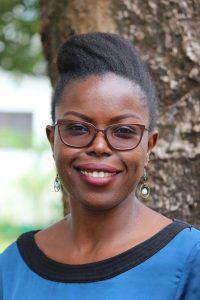Aga Khan University’s Eunice Ndirangu on working to impact healthcare in Sub-Saharan Africa in the time of Covid-19 with a training programme established in partnership with the social impact arm of pharmaceutical firm and established employer of business graduates, Johnson & Johnson
If this pandemic has shown us anything, it is that we still do not have enough trained healthcare workers, particularly nurses. According to the World Health Organization’s (WHO) State of the World’s Nursing report released earlier this year, nurses are the largest occupational group in the health sector, accounting for 59% of the health profession. As a result, WHO declared 2020 the Year of the Nurse and the Midwife, to acknowledge the crucial role they play in healthcare systems. As Covid-19 shook health defences worldwide, everyone retreated indoors to practice social and physical distancing, leaving doctors, nurses, midwives, paramedics and other healthcare workers on the frontline, toiling tirelessly to heal the world.
Partnering with Johnson & Johnson to deliver professional development and training
Since 2001, the Aga Khan University’s School of Nursing and Midwifery East Africa (AKU-SONAM EA) has trained nurses and graduated more than 2,600 nurses and midwives. We have had the privilege to train even more nurses and midwives through continuous professional development courses. None of this would have been accomplished without the backing of Johnson & Johnson Foundation (JJF), formerly the Johnson & Johnson Corporate Citizenship Trust. From 2001, it has provided scholarships to students who would not have been able to access quality higher education without its intervention. Nursing and midwifery leaders in many of Kenya’s largest health institutions can point to Johnson & Johnson as the organisation that sponsored their nursing education.
After the pandemic broke, AKU-SONAM EA partnered with the World Continuing Education Alliance (WCEA), the International Council of Nurses (ICN) and Johnson & Johnson once again to support frontline health workers. The partnership has resulted in a targeted training programme for nurses and midwives in Sub-Saharan Africa and the Middle East through the establishment of a Covid-19 curriculum based on WHO training guidelines which will reach nursing networks through ICN’s partnerships.
Putting the scale of the East Africa’s healthcare challenge in perspective
Europe bore the initial brunt of the outbreak as the world was confronted with the reality of fatigued and infected healthcare workers, dying patients, collapsing economies and a generally grim picture of what was to happen to the rest of the world. On seeing this, East African governments embarked on various measures to cushion against the devastation we all witnessed.
In Kenya, contact tracing, the cessation of movement and a countrywide curfew were used to contain the spread. Tanzania deployed a more ‘open’ strategy which resembled the path chosen by Brazil, and in Uganda there was an initial total lockdown where only essential workers were allowed to move around through private transport. These different strategies adopted by neighbouring countries lay a foundation for regional misunderstanding, but all three countries shared one thing in common: an evident shortage of capable healthcare workers.
WHO puts the number of nurses per 10,000 members of the population at 11.7 in Kenya, 12.4 in Uganda and 5.8 in Tanzania. To put this into context, in the US, for every 10,000 people there are 145.5 nurses. As I write this, the US has the highest number of Covid-related deaths in the world but has more than 10 times the nursing workforce of any East African country. These statistics give a slight preview of the amount of havoc a large-scale breakout of the pandemic would wreak on East Africa.
The nursing workforce is a benchmark because worldwide, nurses form the largest percentage of health personnel. In Kenya, nurses are 85.9% of the healthcare workforce and in many community settings, nurses are the only healthcare representatives available at the grassroots. This is why training them is so vital for vulnerable societies.
Addressing knowledge gaps: Covid-19 training courses
Drawing from the expertise of our faculty, the new partnership with Johnson & Johnson enabled several courses to be developed in April. The courses relate to Covid-19 infection prevention and control, psychosocial support for patients in isolation and healthcare workers. Additionally, we have courses covering Personal Protective Equipment (PPE) for various settings, courses in care for the elderly during the pandemic as well as a course on the management of critical care patients infected with Covid-19. The ‘Covid-19 Infection Prevention and Control’ course is also available in Spanish and will soon be available in several other languages to ensure that no one is left out. The initiative launched in Kenya in April and will soon launch in Uganda and other countries, targeting up to 600,000 nurses and midwives in total who have registered with their national nursing councils. Some of our faculty have received interesting feedback from their international colleagues who have accessed the programme even in the US.
My inspiration for this project comes from interacting with some of the nurses in our work-study programmes. In the beginning, nurses were unsure about how to handle infected patients and nearly put their tools down. There were no standard operating procedures on how to handle patients, there was minimal PPE available for frontline workers and they were generally ill-equipped and operating in the dark. Even when PPEs was available, some nurses and midwives were unsure about which ones were necessary to avoid infection and how to take them off without contaminating themselves at the end of a long shift. One Kenyan nurse shared a story of how in the event of discharging a patient who had recovered from the virus, the patient hugged her. This nurse was scared and her whole team had to be quarantined and tested for Covid-19. Luckily, these tests turned out negative but revealed the need for protocols on how to handle similar situations. A hug in the wrong circumstances can be fatal. We forget that just like many of us, nurses still have to go back to their families and they still self-isolate while at home despite being with their loved ones.
We have seen how devastating the effects of this pandemic have been which is why I believe that it is crucial to provide nurses and midwives with access to Covid-19 resources. I hope that the courses will address important knowledge gaps for nurses and midwives across East Africa even as the disease evolves for all of us.
Dr Eunice Ndirangu (pictured above) is the Dean of the School of Nursing and Midwifery at the Aga Khan University and Chairperson of the Board of the Nursing Council of Kenya. Through nursing practice, teaching, research and policy work, she continues to influence nursing education and policy in East African healthcare systems.





























